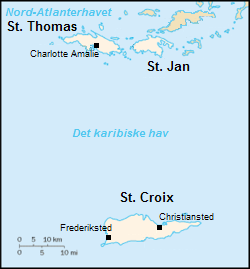The Danish West Indies
| Danish West Indies | ||||||||||
| Dansk Vestindien | ||||||||||
| Colony of Denmark-Norway (1754–1814) Colony of Denmark (1814–1917) |
||||||||||
|
||||||||||
|
|
||||||||||
| Capital |
Charlotte Amalie (1672–1754 and 1871–1917) Christiansted (1754–1871) |
|||||||||
| Languages | Danish, English | |||||||||
| Political structure | Colony of Denmark-Norway (1754–1814) Colony of Denmark (1814–1917) |
|||||||||
| Governor-General | ||||||||||
| • | 1756–1766 | Christian Leberecht von Prøck | ||||||||
| • | 1916–1917 | Henri Konow | ||||||||
| History | ||||||||||
| • | Sold by the Danish West India Company | 1754 | ||||||||
| • | Treaty of the Danish West Indies | March 31, 1917 | ||||||||
| Area | ||||||||||
| • | 400 km2 (150 sq mi) | |||||||||
| Population | ||||||||||
| • | 1911 est. | 27,000 | ||||||||
| Currency |
rigsdaler (1754–1849) daler (1849–1917) |
|||||||||
|
||||||||||
The Danish West Indies (Danish: Dansk Vestindien) or Danish Antilles was a Danish colony in the Caribbean, consisting of the islands of Saint Thomas with 32 square miles (83 km2); Saint John with 19 square miles (49 km2); and Saint Croix with 84 square miles (220 km2). The Danish West India Guinea Company annexed the uninhabited island of Saint Thomas in 1672 and St. John in 1675. In 1733, Saint Croix was purchased from the French West India Company. When the Danish company went bankrupt in 1755, the King of Denmark-Norway assumed direct control of the three islands. Britain occupied the Danish West Indies in 1801–1802 and 1807–1815, during the Napoleonic Wars.
Danish colonizers in the West Indies aimed to exploit the profitable triangular trade, involving the export of firearms and other manufactured goods to Africa in exchange for slaves who were then transported to the Caribbean to work the sugar plantations. The final stage of the triangle involved the export of cargos of sugar and rum to Denmark. The economy of the Danish West Indies depended on slavery. After a rebellion, slavery was officially abolished in 1848, leading to the near economic collapse of the plantations.
In 1852 the Danish parliament first debated the sale of the increasingly unprofitable colony. Denmark tried several times to sell or exchange the Danish West Indies in the late 19th and early 20th centuries: to the United States and to the German Empire respectively. The islands were eventually sold for 25 million dollars to the United States, which took over the administration on 31 March 1917, renaming the islands the United States Virgin Islands.
...
Wikipedia




